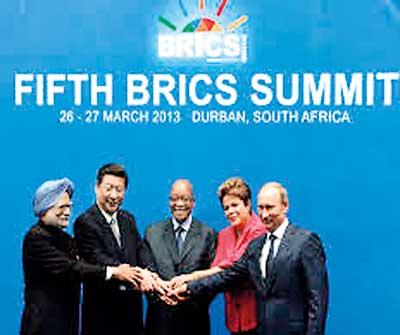Reply To:
Name - Reply Comment
Last Updated : 2024-04-23 20:04:00
.jpg) At the recently concluded fifth BRICS summit held on March 26 and 27, 2013, Russian President Vladimir Putin, likened the BRICS nations – Brazil, Russia, India, China and South Africa – to Africa’s “Big Five” game beasts of trophy hunting lore – the lion, elephant, buffalo, leopard and rhinoceros.
At the recently concluded fifth BRICS summit held on March 26 and 27, 2013, Russian President Vladimir Putin, likened the BRICS nations – Brazil, Russia, India, China and South Africa – to Africa’s “Big Five” game beasts of trophy hunting lore – the lion, elephant, buffalo, leopard and rhinoceros. The Doubting Thomases point out that some major contours of the proposed BRICS bank have yet to be defined and crucial issues remain unaddressed: Will its governance model go by consensus or voting rights? Where will it be domiciled? What will be the size of the corpus, for China is pushing for $100 billion and some others are comfortable with $50 billion? No doubt these will require a lot of effort to reconcile.
The Doubting Thomases point out that some major contours of the proposed BRICS bank have yet to be defined and crucial issues remain unaddressed: Will its governance model go by consensus or voting rights? Where will it be domiciled? What will be the size of the corpus, for China is pushing for $100 billion and some others are comfortable with $50 billion? No doubt these will require a lot of effort to reconcile.
Add comment
Comments will be edited (grammar, spelling and slang) and authorized at the discretion of Daily Mirror online. The website also has the right not to publish selected comments.
Reply To:
Name - Reply Comment
On March 26, a couple arriving from Thailand was arrested with 88 live animal
According to villagers from Naula-Moragolla out of 105 families 80 can afford
Is the situation in Sri Lanka so grim that locals harbour hope that they coul
A recent post on social media revealed that three purple-faced langurs near t